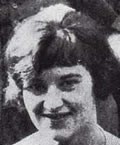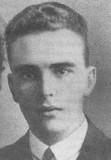Edith Thompson and Freddy Bywaters
| AKA | |
| DOB | Edith 25 Dec 1893 Freddy |
| Occupation | Edith -Fashion Buyer Freddy -Merchant Seaman |
| Kill Total | 1 |
| Kill Place | London |
| Kill Date | 2 Oct 1922 |
| M.O. | Shooting |
| Victim | Percy Thompson |
| Court | The Old Bailey |
|---|---|
| Judge | Mr Justice Shearman |
| Prosecution | Sir Thomas Inskip |
| Defense - Edith | Sir Henry Curtis-Bennett KC |
| Defence - Freddie | Cecil Whiteley KC |
Edith Jessie Graydon was the first of five children of William Eustace Graydon and his wife Ethel Jessie Liles.
During her childhood, Edith was a happy and talented girl who was academically bright.
After leaving school in 1909 she joined a clothing manufacturers. she was employed at Carlton & Prior, wholesale milliners, in the Barbican. Edith quickly established a reputation as a stylish and intelligent woman and was promoted by the company several times, until she became their chief buyer, Edith made regular trips to Paris on behalf of the company.
1909, at the age of 15, Edith met Percy Thompson who was three years older.
15th January 1916, Percy Thompson and Edith Jessie Graydon were married at St Barnabas, Manor Park. He was a shipping clerk, she was working at the Milliners, earning a quite considerable salary of £6 per week – this was more than her husband.
At first, the couple lived in Retreat Road in Westcliff (Southend-on-Sea), before buying a house at 41 Kensington Gardens in the then fashionable London suburb of Ilford.
With both their careers going well they lived a very comfortable life, dining out and visiting the theatre and music halls on a regular basis.
Freddie Bywaters had been lodging with Edith's parents, he was known to the family, as was a close frond of one of Edith's brothers. He moved in as a lodger with Edith and Percy, Percvy still unaware of their relationship.
It seems when they began their affair Edith told Freddie Bywaters that her marriage, outwardly happy and sound, was in reality the opposite, and that she wished she could leave her husband. In Edwardian times, was unlikely. They had no children. Things must have got worse when on one occasion Percy assaulted Edith, bruising her arm in an incident witnessed by Freddie, who stepped in to prevent further injury.
Freddie went back to sea as a merchant seaman, the relationship with Edith continued via letter, with Edith writing to Freddie on an almost daily basis.
2nd October 1922 Edith and Percy were on their way home along the Belgrave Rd, Ilford, Essex, after a trip to the theatre in the West End of London,, when a man rushed out of the darkness and stabbed her husband, Percy, to death. The assailant was heard to shout out "Why don't you get a divorce you Cad". Edith was heard to cry "Don't oh Don't". Edith told police that she had no idea who the attacker was, but, her neighbours were more forthcoming, telling police about the affair that Mrs. Thompson had been having.
Freddy Bywaters was duly tracked down and taken to Ilford police station. In Freddy's locker they found no fewer than 83 love letters from Edith, 49 of which were eventually used as evidence at the trial. Some of the letters discussed poisoning Percy, and one even discussed the fact that Edith had put ground glass into his food. One of the letters from Edith to Freddie said "be jealous so much that you will do something desperate".
Against the advise of her solicitor Edith took the witness box at her trial. Her counsel later said "She spoiled her chances by her evidence, she was a vain woman and an obstinate one".
6th December 1922, at the Old Bailey, in front of judge, Mr Justice Shearman, Freddie Bywaters was defended by Cecil Whiteley KC, and Edith Thompson by Sir Henry Curtis-Bennett KC.
The prosecution for the Crown was led by the Solicitor-General Sir Thomas Inskip, assisted by Travers Humphreys.
Freddie Bywaters cooperated completely throughout the investigations and the trial. He had led police to the murder weapon he had concealed after the murder, and consistently maintained that he had acted alone, and without Edith's knowledge.
11th December 1922, When the jury went out, they took only two hours to come to their decision. The verdict returned was 'Guilty'. The jury decreed that Edith Thompson should hang, as well as Bywaters. When she heard the verdict she screamed, 'I am not guilty. Oh God, I am not guilty!'
9am 9th January 1923, They were both hanged at the same time. Freddy at Pentonville by executioner William Willis, Bywaters went to the gallows a true gentleman, keeping his composure, but still claiming Edith was innocent.
Edith was hanged at Holloway by John Ellis, she had to be drugged and dragged to the gallows.
July 2018, an exhumation order was granted by the Ministry of Justice to René Weis, Edith Thompson's executor and heir.
9am 9th January 1923, They were both hanged at the same time. Freddy at Pentonville by executioner William Willis, Bywaters went to the gallows a true gentleman, keeping his composure, but still claiming Edith was innocent.
Edith was hanged at Holloway by John Ellis, she had to be drugged and dragged to the gallows.
The ordeal of executing Edith Thompson had a huge psychological effect on Ellis. Edith Thompson had collapsed in terror at the prospect of her hanging and, completely unconscious, she had to be supported on the gallows by four prison warders. Various reports suggested that guards had to tie her to a small wooden chair before drawing the noose around her neck.
1924, Interesting fact: a year after the execution of Edith Thompson, Executioner John Ellis, who had taken to drink, attempted suicide, although never officially confirmed, it was suggested by those that knew him that he never got over the Execution of Edith Thompson.
Suicide was a criminal offence in 1924, Ellis was charged and bound over for 12 months.
Suicide was a criminal offence in 1924, Ellis was charged and bound over for 12 months.
September 1932, after another bout of heavy drinking, John Ellis succeeded in his suicide attempt, cutting his throat with a razor.
The body of Edith Thompson was buried in an unmarked grave within the walls of Holloway Prison.
The body of Edith Thompson was buried in an unmarked grave within the walls of Holloway Prison.
During 1971 Holloway prison underwent an extensive programme of extension and rebuilding, during which the bodies of all the executed women buried there, were exhumed for reburial outside the confines of the prison. With the exception of Ruth Ellis. The remains of the four other women executed at Holloway (Edith Thompson, Styllou Christofi, Amelia Sach and Annie Walters) were reburied in a single grave at Brookwood Cemetery in Surrey.
13th November 1993, a grey granite memorial was placed on plot 117, and dedicated to the memory of the four women buried there.
July 2018, an exhumation order was granted by the Ministry of Justice to René Weis, Edith Thompson's executor and heir.
20 November 2018, Edith Thompson's remains were exhumed from Brookwood Cemetery, and on 22 November 2018 she was formally buried alongside her parents, in accordance with her mother's wishes, in the City of London Cemetery.
The remains of Frederick Bywaters still lie in an unmarked grave within the walls of HMP Pentonville, where they were buried shortly after his execution in January 1923.






